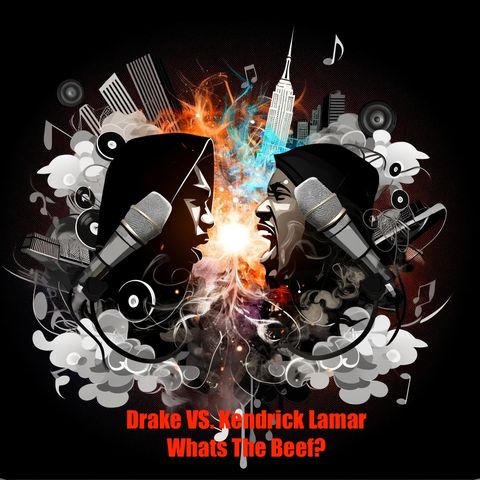Rap Rivals Drake and Kendrick Lamar's Epic Feud Fuels Hip-Hop's Competitive Spirit

Scarica e ascolta ovunque
Scarica i tuoi episodi preferiti e goditi l'ascolto, ovunque tu sia! Iscriviti o accedi ora per ascoltare offline.
Rap Rivals Drake and Kendrick Lamar's Epic Feud Fuels Hip-Hop's Competitive Spirit
Questa è una trascrizione generata automaticamente. Si prega di notare che non è garantita la completa accuratezza.
Descrizione
In the world of hip-hop, feuds and lyrical battles are as much a part of the culture as the beats and rhymes. Two of the biggest names in modern rap,...
mostra di piùThe relationship between Drake and Kendrick Lamar initially appeared friendly, with collaborations that hinted at mutual respect. However, the dynamic between the two shifted dramatically after Kendrick Lamar's verse on Big Sean's 2013 track "Control." Although not a direct diss, Kendrick's verse named several rappers, including Drake, challenging them and claiming his dominance in the scene. This verse is widely regarded as a turning point, raising the stakes in the competitive rap landscape.
Drake's response to "Control" was relatively subdued in direct confrontations but loaded with subtext in interviews and some of his lyrics. He expressed a sense of betrayal over Kendrick's verse, noting that friendly relations in the industry were rare and valued. On tracks like "The Language" from his album "Nothing Was the Same," Drake seemed to subtly fire back, though without naming Kendrick directly.
The situation escalated with the release of Kendrick Lamar's 2015 song "King Kunta," where he criticizes artists who use ghostwriters, a direct jab at Drake who was facing rumors about not writing his own lyrics. Kendrick continued this narrative with “The Heart Part 4” in which he warns an unnamed rapper, believed to be Drake, about his lyrical prowess.
Drake, known for his strategic responses, didn't remain silent. Tracks like “4PM in Calabasas” are speculated to contain veiled references to Kendrick, criticizing his approach and integrity in the music industry. Furthermore, in his collaboration with Future on "Used to This," Drake includes lines that are interpreted as digs at Kendrick's self-proclamation as the “king” of rap.
Despite these back-and-forths, both artists have occasionally downplayed the feud in public statements, suggesting a complex relationship that mixes competition with a deep, albeit competitive, respect for each other’s craft. This rivalry, whether fueled by real animosity or competitive spirits, has resulted in some of the most compelling and critically acclaimed music in contemporary hip-hop, pushing each artist to innovate and excel in a genre that thrives on rivalry and the pursuit of greatness.
As of now, the tension seems to have cooled, with no recent exchanges. However, the history between Drake and Kendrick Lamar remains a testament to hip-hop's competitive nature and its ability to drive cultural conversations.
Informazioni
| Autore | QP-3 |
| Organizzazione | William Corbin |
| Sito | - |
| Tag |
Copyright 2024 - Spreaker Inc. an iHeartMedia Company
